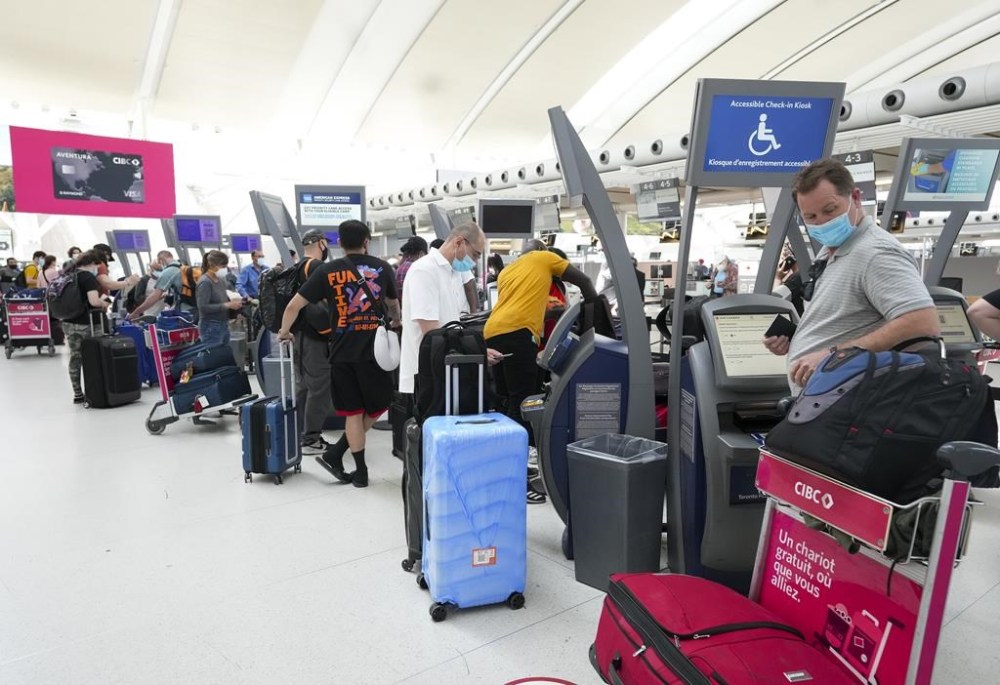U.S. lawmakers, advocates pushing Ottawa to eliminate ArriveCan, open Nexus offices
Advertisement
Read this article for free:
or
Already have an account? Log in here »
To continue reading, please subscribe:
Monthly Digital Subscription
$0 for the first 4 weeks*
- Enjoy unlimited reading on winnipegfreepress.com
- Read the E-Edition, our digital replica newspaper
- Access News Break, our award-winning app
- Play interactive puzzles
*No charge for 4 weeks then price increases to the regular rate of $19.00 plus GST every four weeks. Offer available to new and qualified returning subscribers only. Cancel any time.
Monthly Digital Subscription
$4.75/week*
- Enjoy unlimited reading on winnipegfreepress.com
- Read the E-Edition, our digital replica newspaper
- Access News Break, our award-winning app
- Play interactive puzzles
*Billed as $19 plus GST every four weeks. Cancel any time.
To continue reading, please subscribe:
Add Free Press access to your Brandon Sun subscription for only an additional
$1 for the first 4 weeks*
*Your next subscription payment will increase by $1.00 and you will be charged $16.99 plus GST for four weeks. After four weeks, your payment will increase to $23.99 plus GST every four weeks.
Read unlimited articles for free today:
or
Already have an account? Log in here »
Hey there, time traveller!
This article was published 22/08/2022 (1203 days ago), so information in it may no longer be current.
WASHINGTON – Lawmakers and cross-border business advocates in the United States want Justin Trudeau’s Liberal government to go back to the future in order to ease travel delays between the U.S. and Canada.
Nearly 1,500 emails have been sent to federal MPs and Public Safety Minister Marco Mendicino since the Canadian American Business Council’s new campaign, “Travel Like it’s 2019,” went live two weeks ago.
The online campaign calls on Ottawa to scrap the troublesome ArriveCan app, a mandatory pre-screening tool for visitors to Canada, and to tackle the backlog plaguing the Canada-U.S. trusted-traveller system known as Nexus.

Both are direct symptoms of the COVID-19 pandemic, and are just part of a constellation of factors critics say are causing widespread travel delays across the continent and discouraging some would-be travellers.
But they are also the easiest factors to eliminate, said council CEO Maryscott Greenwood, who fears the pandemic has become an easy excuse to allow for the gradual thickening of the Canada-U.S. border.
“The public health emergency has given governments permission to have an asynchronous approach to what should be synchronous border policy,” Greenwood said in an interview.
“That’s a major shift. That’s really different. And we have to fix that.”
Just last week, Transport Minister Omar Alghabra told the House of Commons transport committee that the lingering after-effects of the pandemic are to blame for chronic travel delays at Canadian airports.
Opposition Conservatives, however, have been trying to make a political lightning rod out of ArriveCan, the smartphone app and web portal visitors must use to upload their travel documentation and vaccination status ahead of time.
So, too, have some U.S. lawmakers.
“This requirement disincentivizes travel, harms the flow of commerce, and burdens travellers with the submission of private health information,” New York Rep. Elise Stefanik, a Republican, wrote in a letter last week to Mendicino and Kirsten Hillman, Canada’s ambassador to the U.S.
Some travellers are intimidated by the app requirement, while others fail to follow the upload procedure until they arrive at the border or the airport, causing customs delays, Stefanik continued.
“As a result, travellers are choosing to stay home rather than face long wait times and frustrations caused by the ArriveCan app.”
On Nexus, New York Democrat Rep. Brian Higgins wrote to Chris Magnus, the commissioner of U.S. Customs and Border Protection, to demand the agency prioritize clearing a backlog of applications on the U.S. end.
The system receives between 8,000 and 15,000 applications a day, Higgins wrote, and the current wait time for an appointment is upwards of nine months.
He also cited recent border statistics that suggest the volume of traffic entering the U.S. is still a shadow of what it was in 2019.
Data released by the border agency last week show 250,678 personal passenger vehicles crossed into the U.S. in the Buffalo-Niagara Falls region in June of this year, compared with 462,665 in June 2019.
“These diminished operations are harmful to the United States economy as well as the quality of life along our northern border,” Higgins wrote.
“The timely processing of Nexus applications and interviews will increase border activity as we work towards recovery from the COVID-19 pandemic.”
The current application backlog for Nexus has reached 350,000. Nexus offices in the U.S. reopened in April, while the 13 enrolment centres in Canada remain closed.
Recent media reports suggest those offices are shuttered because of a dispute over whether U.S. customs officers should be allowed to carry sidearms inside Nexus centres, but Greenwood isn’t convinced.
The bilateral treaty that governs Canada-U.S. preclearance already allows U.S. border guards to retain their sidearms under certain circumstances, she said. The U.S. reportedly wants those terms extended to include Nexus.
Greenwood said she believes the federal government could get those centres opened up promptly if it made it a priority — and she’s hoping the campaign can help make that happen.
“They are hearing about it from us, they are hearing about it from members of Congress and they’re hearing about it from their own constituents,” she said.
“I think it’s escalating to the point where it’s got to be dealt with.”
This report by The Canadian Press was first published Aug. 22, 2022.



